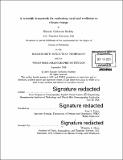A scientific framework for evaluating coral reef resilience to climate change
Author(s)
Barkley, Hannah Catherine
DownloadFull printable version (19.44Mb)
Other Contributors
Woods Hole Oceanographic Institution.
Advisor
Anne L. Cohen.
Terms of use
Metadata
Show full item recordAbstract
The 21st century warming and acidification of tropical oceans will impact the structure and function of coral reef ecosystems. Consequently, conservation efforts are increasingly focused on identifying and protecting reef communities that demonstrate resilience to these changes. In this thesis, I develop a scientific framework for identifying climate change resilience in coral communities and, using Palau's coral reefs as a case study, demonstrate the application of this approach. First, I use coral skeletal records to evaluate the sensitivity of coral communities to episodes of severe thermal stress. This information reveals coral reef communities that consistently exhibit weak responses to multiple high temperature events. Second, I evaluate coral reef community structure across a strong, natural pH gradient using metrics informed by laboratory ocean acidification studies. The coral communities of Palau's Rock Island reefs show a level of pH tolerance that is unique amongst reefs studied to date. Third, I conduct laboratory and field experiments to constrain the pH thresholds of these resilient corals and investigate potential mechanisms for pH tolerance. Finally, I combine archipelago-wide coral temperature and pH sensitivity data to construct climate change resilience indices. My study succeeds in identifying a small number of coral communities that have the potential to withstand 2 1st century climate change and highlights the spatial variability in community responses to ocean warming and acidification. Critically, I present a set of scientific tools and approaches for identifying resilient coral reef communities that has applicability to coral reefs worldwide.
Description
Thesis: Ph. D., Joint Program in Oceanography/Applied Ocean Science and Engineering (Massachusetts Institute of Technology, Department of Earth, Atmospheric, and Planetary Sciences; and the Woods Hole Oceanographic Institution), 2016. Cataloged from PDF version of thesis. Includes bibliographical references.
Date issued
2016Department
Joint Program in Oceanography/Applied Ocean Science and Engineering; Woods Hole Oceanographic Institution; Massachusetts Institute of Technology. Department of Earth, Atmospheric, and Planetary SciencesPublisher
Massachusetts Institute of Technology
Keywords
Joint Program in Oceanography/Applied Ocean Science and Engineering., Earth, Atmospheric, and Planetary Sciences., Woods Hole Oceanographic Institution.